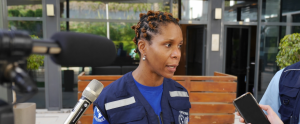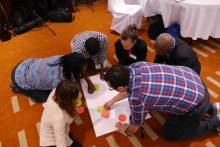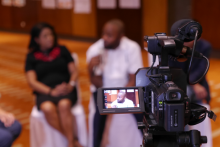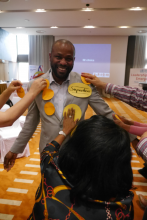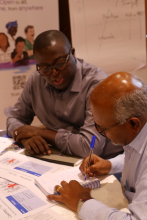Training WHO specialists to captain a health emergency response
To better protect 1 billion people during an emergency situation across its African Region, the World Health Organization is creating a “workforce of excellence” through a rigorous one-year training programme for response experts.
It is a new approach designed to foster a unique type of leadership in managing health emergencies. It is preparing technical specialists to move beyond their field of expertise to deftly handle the complex cross-section of issues that emerge after a particular emergency situation erupts, be it the many types of natural disasters or disease outbreaks that are becoming a norm in this region.
With more than 100 public health emergencies every year in the African Region and recognizing the magnitude of need in any one of them, WHO is not only intensifying its push for national preparedness in each of the 47 Member States on the continent but is looking inward to prepare its own leadership to respond safely and effectively in any crisis.
“Our staff and external experts we deploy in emergencies are all extremely qualified and experienced. However, it’s not only about technical expertise,” said Dr Ibrahima Socé Fall, Assistant Director-General of the WHO Emergency Response Division. “We need to train them to gain leadership skills so that they can manage the ever-changing teams they are leading and to work effectively with national authorities, other agencies and partners.”
To conclude the second phase of the 12-month programme, Dr Fall, along with Dr Michael Yao, Incident Manager of the Ebola outbreak in the Democratic Republic of the Congo and with the Learning and Capacity Development Unit of the WHO Health Emergencies Programme, recently organized a six-day workshop in Dakar, Senegal.
Nearly half of the 20 response experts enrolled in the programme work in the African Region. The others work in the other five WHO regions or its headquarters. The workshop also included 15 WHO staff specialists participating in a separate operations training track focused on programme management, logistics and planning.
After four days of classroom exercises to strengthen critical skills for working in emergencies – including emotional intelligence, problem-solving, negotiation and teamwork – the workshop concluded with an intense 40-hour simulation exercise that combined both tracks into emergency response teams.
“We need to help our best technical experts to become stronger leaders to manage the complexity of today’s emergencies and protect the most vulnerable,” said Dr Yao.
According to participants, the workshop was eye-opening. “The training should form a critical part of the ongoing development of any staff working in the health emergency department with leadership responsibility. It focused on the often-overlooked soft capacities, which are extremely critical,” said Nicole Wynter, who is an advisor with the Programme Management and Administration of the Health Emergencies Programme in Pan American Health Organization.
“Many [typical] trainings tend to focus on the functional or technical competencies, but this one focused on soft capacities to not only facilitate your function as a leader but also as a team player,” Wynter added.
“I’ve been practising leadership, but this training opened my eyes to the different types of leadership and the need to adjust at times to situations. I will have to take into account emotional intelligence to put it together,” said Mohamadou Bachir Mbodj, who works with the WHO Health Cluster Coordinator in Mali.
Prior to the Dakar workshop, the leadership learning programme participants completed an intermediate-level online course on the WHO Incident Management System, a Myers-Briggs personality assessment, pre-course readings, a written assignment and an introductory live briefing. The final phase of the programme will include additional learning opportunities, including online briefings, coaching and practice deployments.
The workshop was made possible with financial support from the Russian Federation and the United States of America.



